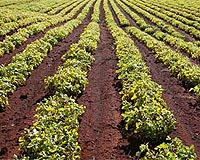 |
Beijing (AFP) Nov 24, 2009 China executed two men on Tuesday for their roles in a contaminated milk powder scandal last year that led to the deaths of at least six infants and sickened up to 300,000, state media said. Zhang Yujun and Geng Jinping had been sentenced to death earlier this year by a court in the northern city of Shijiazhuang for producing and selling toxic ingredients that ended up in the infant milk powder, Xinhua news agency said. The city's Yanzhao Metropolitan Daily quoted a statement by China's Supreme People's Court as saying the executions were justified by the harm caused by the actions of the two men. "The crimes of Zhang Yujun and the circumstances surrounding them are serious, his criminal methods were vile and did extreme harm to society," the paper quoted the high court's execution order as saying. It issued a similar justification for Geng's death sentence. They were executed after their appeals were turned down in March, Xinhua said. All death sentences in China must be approved by the Supreme People's Court. AFP calls to courts in Shijiazhuang went unanswered. The scandal came to light in September 2008, reviving fears over product safety in China and leading to recalls and bans around the world of goods containing Chinese dairy products. Xinhua said Zhang was convicted of producing more than 770 tonnes of protein powder laced with the industrial chemical melamine from July 2007 to August 2008 and selling more than 600 tonnes. The chemical, which is used to make plastics, was mixed into milk to give the appearance of higher protein content. Geng was found guilty of selling milk tainted by the powder to dairy brokers as well as to the now-defunct Sanlu Group, the dairy giant that was at the centre of the scandal, it added. The scandal erupted just after the Beijing Olympics in August 2008, and there were widespread reports that officials had sought to cover it up to prevent embarrassment during the Games. At least six babies died and nearly 300,000 others fell ill with kidney stones, kidney failure and other urinary tract problems after consuming products laced with melamine. In all, 22 Chinese dairy firms were found to have sold tainted milk and were subsequently ordered by the government to pay 160 million dollars in compensation to the families of children who died or fell ill. Many families and their lawyers complained that the compensation payments were inadequate and demanded the government step up its food safety regime. Altogether 21 people have been convicted for their roles in the scandal including former Sanlu boss Tian Wenhua, who was given life in prison. One other person was given a suspended death penalty, a sentence that routinely gets commuted to life in jail, while 15 others were imprisoned for terms ranging from two to 15 years. The Sanlu Group, once one of China's largest dairy manufacturers, was declared bankrupt in February after having amassed 1.1 billion yuan (161 million dollars) of debt, Xinhua reported at the time. Share This Article With Planet Earth
Related Links Farming Today - Suppliers and Technology
 Failure To Focus On Farming Could Lead To Increased Hunger
Failure To Focus On Farming Could Lead To Increased HungerRome, Italy (SPX) Nov 19, 2009 Alarmed by a substantial oversight in the global climate talks leading up to the United Nations Climate Change Conference in Copenhagen next month, more than 60 of the world's most prominent agricultural scientists and leaders underscored how the almost total absence of agriculture in the agreement could lead to widespread famine and food shortages in the years ahead. Signatories of a stat ... read more |
|
| The content herein, unless otherwise known to be public domain, are Copyright 1995-2009 - SpaceDaily. AFP and UPI Wire Stories are copyright Agence France-Presse and United Press International. ESA Portal Reports are copyright European Space Agency. All NASA sourced material is public domain. Additional copyrights may apply in whole or part to other bona fide parties. Advertising does not imply endorsement,agreement or approval of any opinions, statements or information provided by SpaceDaily on any Web page published or hosted by SpaceDaily. Privacy Statement |